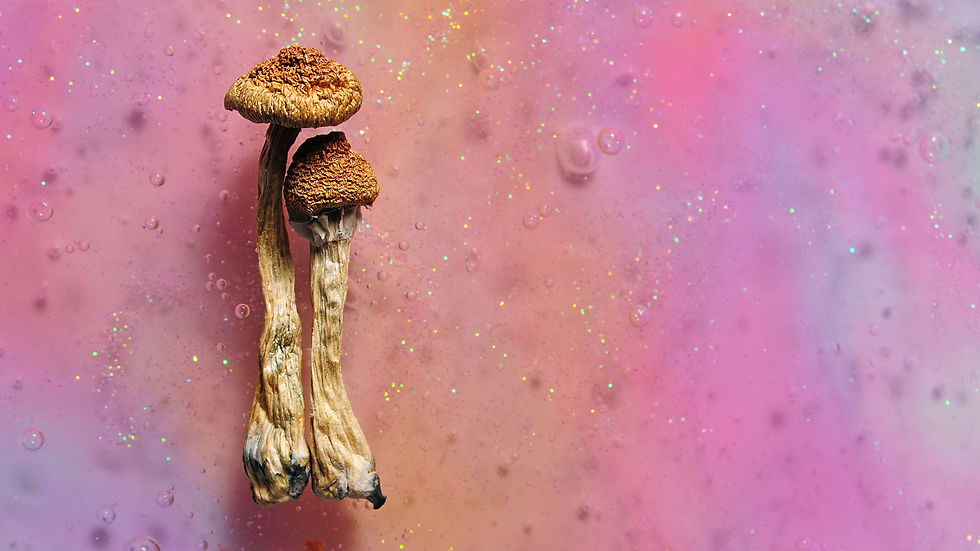Psilocybin-Assisted Therapy for Treatment-Resistant Depression: A Clinical Perspective
- Jul 29, 2025
- 5 min read
Author: Dr James Woolley, Consultant Psychiatrist at Schoen Clinic Chelsea.
In psychiatry, one of our greatest challenges is helping individuals who suffer from treatment-resistant depression (TRD), a condition where standard approaches like antidepressant medication and talking therapies have not provided significant relief. For these patients, finding effective alternatives is both a clinical and deeply personal priority.
One promising area of research innovation in mental health care is psilocybin-assisted therapy. You may have seen headlines about psychedelic treatments for depression, and at Schoen Clinic Chelsea, we’re occasionally asked about them. As clinical trials progress here in the UK, it's important to move beyond the media hype and understand this treatment from a scientific and clinical perspective.

What Is Psilocybin-Assisted Therapy for Depression?
Psilocybin-assisted therapy is a highly structured, medically supervised treatment involving a synthesised dose of psilocybin, the active psychedelic compound found in certain mushrooms, administered in a controlled therapeutic environment.
Importantly, psilocybin, with the chemical formula C12H17N2O4P, is not the treatment in isolation. Rather, it acts as a catalyst to enhance the effectiveness of intensive psychotherapy. This process is carefully managed by trained clinicians and includes screening, preparation, and ongoing psychological support.
It’s essential to distinguish this approach from the recreational use of psilocybin mushrooms, which carries risks including potential psychotic episodes. In clinical settings, patient safety and strict eligibility criteria are fundamental.
How Psilocybin Works in the Brain: The Neurobiological Hypothesis
Current research suggests that psilocybin works very differently from conventional antidepressants, which typically take weeks to act on serotonin transporters. Psilocybin, instead, stimulates the 5-HT2A serotonin receptor, triggering a temporary but profound change in brain activity.
Key mechanisms include:
Disrupting Rigid Brain Networks: Brain imaging studies in chronic depression often reveal overactivity in the Default Mode Network (DMN) - a network linked to self-reflection and rumination. In depression, this can trap individuals in cycles of negative thinking. Psilocybin appears to temporarily quiet and "dis-integrate" this network, potentially unlocking new perspectives.
Promoting Neuroplasticity: Psilocybin also induces a short-lived state of heightened neuroplasticity, during which the brain becomes more open to change. With therapeutic support, individuals may be better able to reshape thought patterns and emotional responses, catalysing a fundamental reset to support lasting recovery, rather than simply masking symptoms.

What Does Psilocybin Therapy Involve?
In UK clinical trials (such as those at Imperial College London and King’s College London), psilocybin-assisted therapy follows a rigorous model:
Preparation Sessions: Patients attend several sessions with two trained therapists to build trust, discuss expectations, and set therapeutic intentions.
The Dosing Session: A single session, lasting 6-8 hours, takes place in a calm, non-clinical, and supportive setting. Two therapists remain present throughout to provide emotional and psychological support.
Integration Sessions: Follow-up therapy is provided to help patients reflect on their experiences and embed new insights into daily life and behaviour.
This structured approach is essential. Without the integration phase, the therapeutic benefits of psilocybin may be limited or lost.

Who Is It For - and Is It Available?
At present, psilocybin-assisted therapy is not legally available in the UK outside of clinical trials. It remains a research-based treatment and is not currently offered by the NHS or by private clinics.
Initial findings from Phase II and III trials are highly encouraging, especially for patients who have not responded to traditional depression treatments. However, psilocybin therapy is not a "magic bullet," and it’s not suitable for everyone.
Individuals with personal or family histories of psychosis (like schizophrenia) or bipolar disorder are typically excluded from trials due to the potential for adverse reactions. Suitability is carefully assessed during screening.
Why It Matters
This emerging therapy represents a genuinely exciting development in the field of mental health. By offering a novel mechanism of action, psilocybin-assisted therapy may provide hope to patients who have exhausted other options. It also reflects a broader shift in psychiatry: toward neuroplastic, integrative treatments that focus on root causes.
At Schoen Clinic Chelsea, we’re committed to keeping up with the latest clinical advances while prioritising safe, evidence-based care for our patients.
Global Momentum for Psilocybin-Assisted Therapy
Psychedelic-assisted therapy isn’t just gaining ground in clinical research; it’s also capturing public attention, driven by advocates who’ve experienced its transformative potential firsthand.

One such advocate is Eliza Dushku, best known for her role as Faith in the cult TV series, Buffy the Vampire Slayer. While Buffy is back in the spotlight with a planned reboot, Dushku has taken a very different path. After stepping away from acting, she retrained in psychedelic-assisted therapy and now champions trauma research and alternative treatments in the U.S.
Dushku has publicly shared her own experience with psychedelic-assisted therapy for PTSD, describing it as a powerful tool in her healing process. She now supports clinical trials exploring the use of psychedelics in treating trauma, addiction, and treatment-resistant depression, helping to destigmatise their use and shift public perception.
This growing cultural momentum mirrors developments around the world. In June 2025, New Zealand approved psilocybin for use in treatment-resistant depression - a major step forward in recognising its therapeutic value. Similar frameworks are already in place in Australia, Switzerland, Canada, and parts of the United States, including Oregon, Colorado, and New Mexico. Read more about New Zealand’s psilocybin therapy approval here.
In the U.S., military veterans are becoming some of the most vocal proponents of psychedelic therapy. Substances like psilocybin, ibogaine, and MDMA are being studied for their potential to help veterans with post-traumatic stress disorder (PTSD) process combat trauma and reduce suicidal ideation.
Many, like former Marine sniper Luke Focer and Army veteran Sally Roberts, say psychedelic therapy has been life-saving. Read more about the push for psychedelic therapy for veterans in North Carolina.
Together, these global policy changes and personal stories are driving a deeper public understanding of psychedelics in mental health treatment. While research in the UK is still in early stages, this international shift signals growing acceptance of psychedelic-assisted therapy as a serious clinical tool, not just a countercultural curiosity.
Further Reading and Support
Frequently Asked Questions
Is psilocybin-assisted therapy legal in the UK? Currently, psilocybin-assisted therapy is only available through approved clinical trials. It is not yet a licensed treatment on the NHS or in private practice.
How does psilocybin help with treatment-resistant depression? It temporarily disrupts rigid brain networks associated with negative thinking and increases neuroplasticity, potentially allowing for new insights and mental shifts with the support of therapy.
Can anyone access psychedelic therapy for depression? No. Individuals are carefully screened. Those with a history of psychosis or bipolar disorder are typically excluded for safety reasons.
Thinking About Treatment for Depression?
If you’re struggling with depression that hasn’t improved with medication or therapy, you’re not alone.
Our expert team at Schoen Clinic Chelsea specialises in personalised, evidence-based treatment for complex mental health conditions.
👉 Contact us today to learn more about your options.
About the Author: Dr James Woolley is a Consultant Psychiatrist at Schoen Clinic Chelsea with a special interest in complex trauma, anxiety disorders and emerging treatments for treatment-resistant mental health conditions.
*This article has been edited for clarity and digital publication.*



